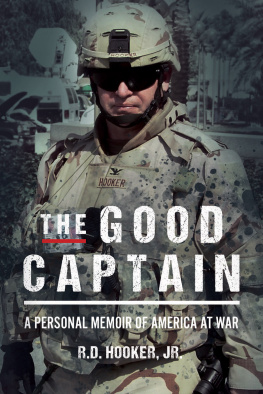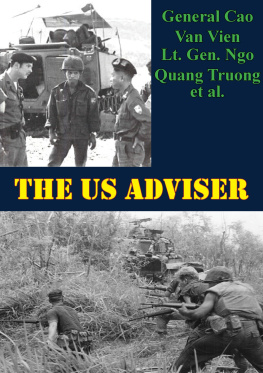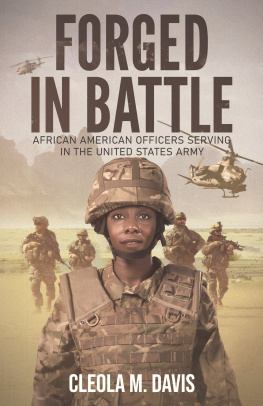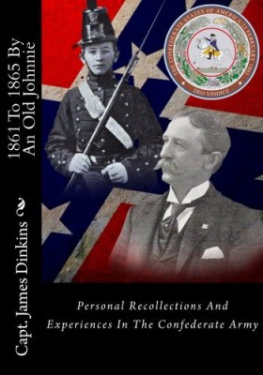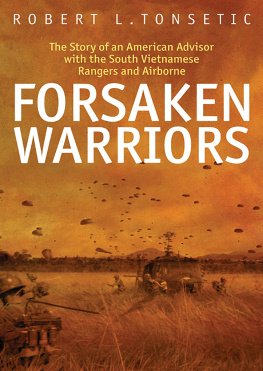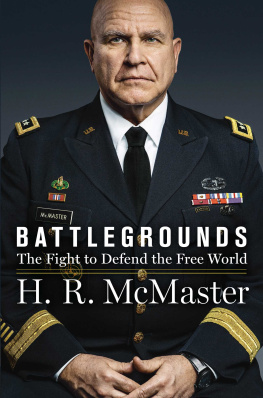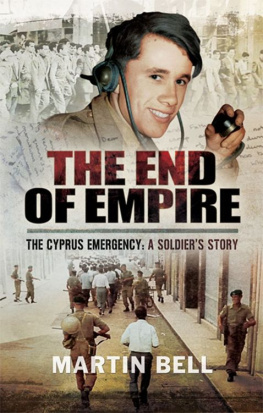


AN AUSA BOOK
Association of the United States Army
2425 Wilson Boulevard, Arlington, Virginia, 22201, USA
Published in the United States of America and Great Britain in 2022 by
CASEMATE PUBLISHERS
1950 Lawrence Road, Havertown, PA 19083, USA
and
The Old Music Hall, 106108 Cowley Road, Oxford OX4 1JE, UK
Copyright 2022 R. D. Hooker, Jr.
Hardback Edition: ISBN 978-1-63624-148-7
Digital Edition: ISBN 978-1-63624-149-4
A CIP record for this book is available from the British Library
All rights reserved. No part of this book may be reproduced or transmitted in any form or by any means, electronic or mechanical including photocopying, recording or by any information storage and retrieval system, without permission from the publisher in writing.
The views expressed in this publication are those of the author and do not necessarily reflect the official policy or position of the Department of Defense or the U.S. government.
Printed and bound in the United Kingdom by TJ Books
Typeset in India by Lapiz Digital Services, Chennai.
For a complete list of Casemate titles, please contact:
CASEMATE PUBLISHERS (US)
Telephone (610) 853-9131
Fax (610) 853-9146
Email:
www.casematepublishers.com
CASEMATE PUBLISHERS (UK)
Telephone (01865) 241249
Email:
www.casematepublishers.co.uk
D EDICATION
To my soldiers, who remain ever young.
Understand this when we lay our heads down out here, were all prisoners.
C APTAIN J OSEPH J. B LOCKER , H OSTILES
Contents
Foreword
This book is memoir, not history, although I have tried to be as accurate and factual as memory and open sources will allow. In a long military career, I found myself at the center of great events occasioned by the breakup of the Soviet Union and by 9/11. Over 32 years of military service as a soldier and officer of parachute infantry, I served all over the world in peace and war: in the invasion of Grenada; in Somalia in humanitarian crisis and tribal strife; in Rwanda in the immediate aftermath of the genocide; with the first American unit to enter Bosnia and the first to enter Kosovo; as a peacekeeper in the Sinai desert; as a witness to the attack on the Pentagon on 9/11; at the height of the war in Iraq and, at the end of my career, with my son in Afghanistan.
My life has been shaped and defined by waras a child, as a career soldier, and even into retirement through my sons, both paratroop officers and combat veterans. As a young man I sought adventure and to lead troops in combat. I had my fill, and more. Along the way I served four presidents in the White House, struggling with the weighty questions of strategy and policy. I have come to believe that we fight too much, and win too little, with the costs of war falling only on a narrow slice of our society. But as a soldier, I acknowledge the right of the people and their elected leaders to make those decisions, though at times I regretted them. An Army that picks and chooses its wars has no place in a democracy.
I feel profound gratitude for my West Point classmates and for the officers, sergeants, and troopers I was blessed to serve with. They made a difficult and dangerous life rich, full, and rewarding. Above all, I thank my beautiful and wise wife Beverly and my wonderful children. Their love and support made it possible for me to serve.
At the top and in the trenches, our wars taught me much, but above all about American combat soldiers. Profane, independent, stubborn, and aggressive, they are also warm-hearted, intelligent, selfless, and always, always brave. As Churchill famously said, Courage is the first of all the virtues, because it enables all the rest. He was right. This, then, is my story, and theirs.
CHAPTER 1
Duty, Honor, Country
I have made fellowships,
untold of happy lovers in old song.
For love is not the binding of fair lips
but wound with wars hard wire whose stakes are strong.
W ILFRED O WEN , A POLOGIA P RO P OEMATE M EO

In early February of 2017, I walked into the main dining room of the Army Navy Club on Farragut Square in Washington to have dinner with Lieutenant General H. R. McMaster, who had just been announced as President Trumps national security advisor. With me was Major General Rick Waddell, soon to be selected as deputy national security advisor. My own appointment as special assistant to the president and senior director for Europe and Russia at the National Security Council would follow soon after. The three of us were old friends, all graduates of West Point, and all veterans of years spent fighting in Iraq and Afghanistan. Our careers had intersected many times around an Army posted in far-flung places and almost constantly at war. The dinner was not festive, nor a joyous reunion. We had few illusions about what came next. Over our brandy, I admitted to Rick that despite my deep respect and admiration for him and for McMaster, I had serious misgivings about joining the Trump administration. I have never forgotten his response: We are sworn officers of the Republic. When asked to serve, we serve.
My journey to Farragut Square and the White House began some 40 years before as an 18-year-old soldier, but its origins ran much deeper than that. People like to glorify their past, but so far as I can tell my family, on both sides, was of humble origins, coming to America long before the Revolution in search of a better life. My fathers family descends from an English colonist, Thomas Hooker, who immigrated to the Jamestown colony in 1620. His descendent, Samuel B. Hooker, was born in 1778 and served in a Tennessee militia regiment during the War of 1812. Many Hookers from southern Tennessee and northern Mississippi later served, mostly as private soldiers, in the army of the Confederacy. (The famous northern general, Fighting Joe Hooker, was born in Massachusetts and was probably not related.)
My mothers family was better documented, and we know that Abraham Macklemore, a merchant and tradesman, emigrated to the New World from Ayrshire in Scotland in 1668. By the early 1700s, he owned more than 700 acres in North Carolina, and as younger sons moved westward the family continued to prosper. By 1860, Abrahams great-grandson John Dabney McLemore was established in Carroll County, Mississippi; the 1860 census valued his net worth at more than $700,000, a stupendous sum for the time. Both his sons, Price and Jefferson, enrolled at the University of Mississippi and, at the outbreak of war, joined the entire student body in enlisting in Company A, 11th Mississippi Volunteer Infantry, the famous University Greys. Jefferson appears on the roll as Third Lieutenant, but he transferred to the cavalry where he fought at First Manassas and was badly wounded, shot through the hip, outside Atlanta in 1864. Price, my great-great-grandfather, was called The Prince by his friends. He served throughout the war as company first sergeant and was captured at High Bridge, in Virginia, only two days before the surrender at Appomattox.
Price, it would seem, had a war that was both glorious and terrible. His regiment fought in most of the major engagements in Lees Army of Northern Virginia, participating in Picketts Charge at the battle of Gettysburg, where the 11th Mississippi suffered 100 percent casualties, penetrating more deeply into northern positions than any other. Price suffered a serious head wound that day (he would be wounded four times during the war), and the 11th would show only 13 original members at wars end. There is a pretty story, probably apocryphal, telling of his arrival at home on sick leave the same day that a telegram arrived announcing his death in action. Price cannot have enjoyed good health afterwards. Settling in Tennessee after the war he lived only 11 more years, dying at 37. Nor did his familys wealth survive the war. In a petition for amnesty filed in 1865, his father claimed debts of $300,000. He and the southern planter class he represented bore much of the responsibility for this, the most terrible of Americas wars, and one fought for the worst of all causes, to preserve the institution of slavery. Sam Houston, still governor of Texas in 1860 and an experienced general, had warned the South that it would likely lose. Let me tell you what is coming, he prophesied. After the sacrifice of countless millions of treasure and hundreds of thousands of lives, you may win Southern independence, if God be not against you, but I doubt it the North is determined to preserve this Union they move with the steady momentum and perseverance of a mighty avalanche. Houston was right, and it was perhaps not unjust that John Dabneys portion was mutilated sons and financial ruin.
Next page
